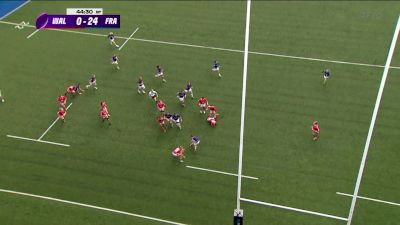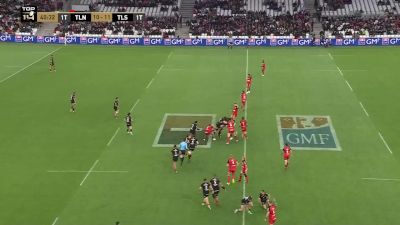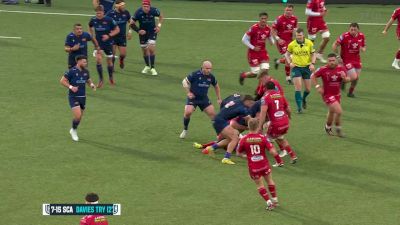Q&A With Dallen Stanford: Reacting To World Cup Residency Rule Change
Q&A With Dallen Stanford: Reacting To World Cup Residency Rule Change
What does the new Rugby World Cup residency rules mean and how will it affect future prospects? Dallen Stanford breaks it down.

Following a landmark decision by World Rugby to change its eligibility requirements this week, we caught up with rugby commentator Dallen Stanford to get his thoughts on what extending the residency qualification period from three to five years means for international players and how will it affect future prospects when it's implemented in 2020.
A former USA sevens player, Stanford was born in Cape Town, South Africa, and represented the Eagles on the Sevens World Series from 2006-09. He is currently the program director of Play Rugby USA in Los Angeles, runs summer camps through SoCal Rugby Camps, and is a rugby commentator for World Rugby (Las Vegas 7s and Vancouver 7s), ESPN, CBS, USA Rugby, Infinity Park, and The Rugby Channel.
FloRugby: What is your opinion on the new rules?
Stanford: The reform of Regulation 8 has some advantages and disadvantages -- and I can certainly see why World Rugby has decided to make some changes. Many countries have benefited from overseas born players bolstering their squads, and one that comes to mind right away is Japan. They fielded seven players from New Zealand in their 2015 RWC squad (11 total foreign born, although three players attended high school in Japan) -- and with the old rules only had to bring those players into the cycle during 2012. In the USA, we have benefited tremendously by this as well (nine players at RWC 2015 were born overseas), but I do see huge potential for rugby players and unions to abuse the system.
The new ruling makes it more difficult for nations to scout talented players for their immediate RWC campaigns, unless of course foreign players decide to make their adopted country their home from an early age.
Al Caravelli spotted me at the 2006 USA National 7s Championships while I played for the Oxy Tigers (under coach James Walker). I didn't even realize one could play for another country -- so when Coach Caravelli selected me for the Sevens World Series -- it was a dream come true. I was 27 years at the time, so if I had to wait a further two years, I wouldn't have had the amazing opportunity to represent the USA at 15 events around the world.
A former USA sevens player, Stanford was born in Cape Town, South Africa, and represented the Eagles on the Sevens World Series from 2006-09. He is currently the program director of Play Rugby USA in Los Angeles, runs summer camps through SoCal Rugby Camps, and is a rugby commentator for World Rugby (Las Vegas 7s and Vancouver 7s), ESPN, CBS, USA Rugby, Infinity Park, and The Rugby Channel.
FloRugby: What is your opinion on the new rules?
Stanford: The reform of Regulation 8 has some advantages and disadvantages -- and I can certainly see why World Rugby has decided to make some changes. Many countries have benefited from overseas born players bolstering their squads, and one that comes to mind right away is Japan. They fielded seven players from New Zealand in their 2015 RWC squad (11 total foreign born, although three players attended high school in Japan) -- and with the old rules only had to bring those players into the cycle during 2012. In the USA, we have benefited tremendously by this as well (nine players at RWC 2015 were born overseas), but I do see huge potential for rugby players and unions to abuse the system.The new ruling makes it more difficult for nations to scout talented players for their immediate RWC campaigns, unless of course foreign players decide to make their adopted country their home from an early age.
How will this affect the national teams?
There is a grace period, so players in the current system will be unaffected, but it means national team coaches will have to keep careful track of foreign-born athletes in the system. Of importance will be tracking younger players who attend college or university and then keeping them in the pathway for another year or two before they qualify for national team selection. Players that arrive in their mid-20s in a foreign country will most likely not be capped at 30 years of age, which does rule out some tremendous talent for many nations.What will be the impact on the competitiveness of the matches/teams? Are there a few nations that stand out to you that will be hurt more than others by this change?
Countries like New Zealand -- who often field players from Fiji, Samoa, and Tonga -- will have to wait a bit longer to have additional breakout players join the All Blacks. Tier I nations won't be impacted tremendously, but rather Tier II countries will have a harder time competing against the top 10 in the world. Japan defeating South Africa at RWC 2015 was one of the most memorable and inspiring moments in rugby history. It gave Tier II nations hope for competing against countries that are blessed with vast financial and player resources.What would you have done if these rules were in place previously when you were vying for a national team roster spot?
I wouldn't be able to say I once tackled Waisale Serevi!Al Caravelli spotted me at the 2006 USA National 7s Championships while I played for the Oxy Tigers (under coach James Walker). I didn't even realize one could play for another country -- so when Coach Caravelli selected me for the Sevens World Series -- it was a dream come true. I was 27 years at the time, so if I had to wait a further two years, I wouldn't have had the amazing opportunity to represent the USA at 15 events around the world.
Any other comments or concerns about this update to the rules?
World Rugby vice president Agustin Pichot said the new ruling is "a great step towards protecting the integrity, ethos and stature of international rugby," and I do appreciate what he means when you look at the broader picture.Related Content
 USA And Saracens Women's Rugby Star Lottie Clapp Previews The PAC4
USA And Saracens Women's Rugby Star Lottie Clapp Previews The PAC4Apr 24, 2024
 Munster Rugby Chasing Title Winning Momentum Again In South Africa
Munster Rugby Chasing Title Winning Momentum Again In South AfricaApr 24, 2024
 How to Watch: 2024 Queensland Reds vs Blues | Rugby
How to Watch: 2024 Queensland Reds vs Blues | RugbyApr 23, 2024
 BKT United Rugby Championship Round 14 Recap: Table Toppers Toppled
BKT United Rugby Championship Round 14 Recap: Table Toppers ToppledApr 22, 2024
 Replay: Union Bordeaux vs ASM Clermont - 2024 Union Bordeaux vs ASM-Rugby | Apr 21 @ 4 PM
Replay: Union Bordeaux vs ASM Clermont - 2024 Union Bordeaux vs ASM-Rugby | Apr 21 @ 4 PMApr 21, 2024
 Replay: Wales vs France | Apr 21 @ 2 PM
Replay: Wales vs France | Apr 21 @ 2 PMApr 21, 2024
 Replay: RC Toulonnais vs Stade Toulousain | Apr 20 @ 7 PM
Replay: RC Toulonnais vs Stade Toulousain | Apr 20 @ 7 PMApr 20, 2024
 Replay: Connacht vs Zebre Parma | Apr 20 @ 8 PM
Replay: Connacht vs Zebre Parma | Apr 20 @ 8 PMApr 20, 2024
 Replay: Edinburgh vs Scarlets | Apr 20 @ 8 PM
Replay: Edinburgh vs Scarlets | Apr 20 @ 8 PMApr 20, 2024